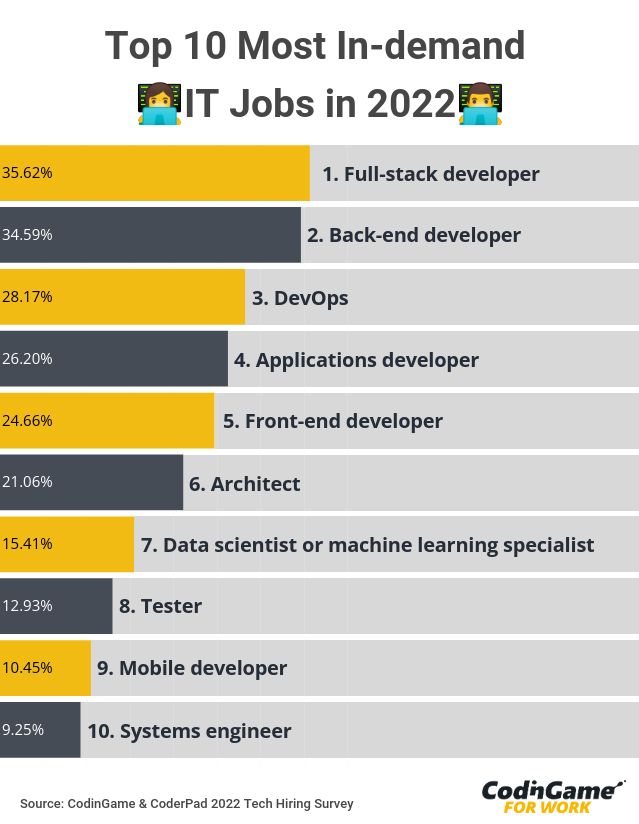Navigating the Shifting Job Market Landscape
The job market is undergoing a significant transformation, driven by technological advancements, globalization, and demographic shifts. As a result, the most demand jobs in the future will require workers to adapt and acquire skills that are in high demand. The World Economic Forum predicts that by 2022, more than a third of the desired skills for most jobs will be comprised of skills that are not yet considered crucial to the job today. This shift highlights the need for workers to be agile and responsive to changing industry trends.
Technological advancements, such as artificial intelligence and automation, are revolutionizing the way businesses operate, making certain skills obsolete while creating new ones. For instance, the rise of e-commerce has led to an increased demand for professionals with expertise in digital marketing, data analysis, and logistics management. Similarly, the growing concern for climate change and sustainability has created a surge in demand for professionals in renewable energy, environmental science, and sustainable development.
Globalization has also led to an increase in demand for professionals with international expertise, language skills, and cultural competence. As businesses expand globally, they require workers who can navigate diverse cultural landscapes and communicate effectively with international clients and partners.
Demographic shifts, such as the aging population and changing workforce demographics, are also driving changes in the job market. The healthcare industry, for example, is facing a significant shortage of professionals, including nurses, doctors, and allied health workers, to cater to the needs of an aging population.
To remain relevant in this shifting job market landscape, workers must be willing to upskill and reskill to meet the demands of emerging industries and job roles. This requires a commitment to lifelong learning, a willingness to adapt to new technologies and trends, and a focus on developing skills that are complementary to automation and artificial intelligence.
How to Identify Emerging Job Opportunities
Identifying emerging job opportunities requires a combination of research, analysis, and strategic thinking. To stay ahead of the curve, it’s essential to analyze industry trends, job market analytics, and educational requirements. This will help you understand the skills and qualifications required for in-demand jobs and make informed decisions about your career.
One way to identify emerging job opportunities is to analyze labor market data and trends. This can be done by researching online job postings, industry reports, and labor market analytics tools. For example, the Bureau of Labor Statistics (BLS) provides data on employment trends, job growth, and wages. By analyzing this data, you can identify industries and occupations that are experiencing growth and demand.
Another way to identify emerging job opportunities is to research industry trends and forecasts. This can be done by reading industry publications, attending conferences and events, and networking with professionals in your desired field. For example, the World Economic Forum’s Future of Jobs Report provides insights into the jobs and skills that will be in demand in the future.
It’s also essential to consider the educational requirements for emerging job opportunities. Many in-demand jobs require specialized skills and qualifications, such as data science, artificial intelligence, and cybersecurity. By researching the educational requirements for these jobs, you can identify the skills and qualifications you need to acquire to be competitive.
In addition to analyzing industry trends and educational requirements, it’s also important to consider the skills and qualifications required for emerging job opportunities. Many in-demand jobs require a combination of technical and soft skills, such as communication, collaboration, and creativity. By identifying the skills and qualifications required for emerging job opportunities, you can develop a plan to acquire the skills and qualifications you need to be competitive.
Some of the most demand jobs in the future will require workers to have a combination of technical and soft skills. For example, data scientists will need to have strong analytical and problem-solving skills, as well as the ability to communicate complex data insights to non-technical stakeholders. Similarly, artificial intelligence engineers will need to have strong programming and software development skills, as well as the ability to collaborate with cross-functional teams.
The Rise of the Digital Age: In-Demand Tech Careers
The digital age has brought about a significant shift in the job market, with a growing demand for tech professionals who can design, develop, and implement innovative solutions. Among the most demand jobs in the future, tech careers are expected to experience rapid growth, driven by the increasing need for digital transformation, cybersecurity, and data-driven decision-making.
Data scientists, for example, are in high demand due to the exponential growth of data and the need for businesses to make data-driven decisions. To become a data scientist, one needs to possess strong analytical and problem-solving skills, as well as expertise in programming languages such as Python, R, and SQL. Additionally, data scientists need to have a solid understanding of machine learning algorithms and statistical modeling techniques.
Artificial intelligence (AI) engineers are another in-demand profession, as businesses seek to leverage AI and machine learning to automate processes, improve efficiency, and enhance customer experiences. AI engineers need to have a strong foundation in computer science, mathematics, and software engineering, as well as expertise in AI frameworks such as TensorFlow and PyTorch.
Cybersecurity experts are also in high demand, as the rise of digital technologies has created new vulnerabilities and threats to businesses and individuals. Cybersecurity experts need to have a strong understanding of computer systems, networks, and software, as well as expertise in threat analysis, penetration testing, and incident response.
Other in-demand tech careers include cloud computing professionals, DevOps engineers, and full-stack developers. These professionals need to have a strong foundation in computer science, software engineering, and programming languages such as Java, Python, and JavaScript.
To succeed in these tech careers, professionals need to have a combination of technical and soft skills, including communication, collaboration, and creativity. They also need to be adaptable and willing to continuously learn and upskill, as the tech landscape is constantly evolving.
According to the Bureau of Labor Statistics, employment of software developers is projected to grow 21% from 2020 to 2030, much faster than the average for all occupations. Similarly, employment of data scientists and statisticians is projected to grow 14% from 2020 to 2030, driven by the increasing need for data-driven decision-making.
Healthcare and Biotechnology: Meeting the Needs of an Aging Population
The healthcare industry is experiencing a significant shift due to the aging population and the increasing need for healthcare services. As a result, there is a growing demand for healthcare professionals, including nurses, doctors, and allied health workers. According to the Bureau of Labor Statistics, employment of healthcare occupations is projected to grow 14% from 2020 to 2030, much faster than the average for all occupations.
Biotechnology is also playing a crucial role in meeting the needs of an aging population. Advances in biotechnology have led to the development of new treatments and therapies for age-related diseases, such as Alzheimer’s and Parkinson’s. Biotechnology companies are also working on developing new diagnostic tools and treatments for age-related diseases.
Nurses are in high demand, particularly those with specialized skills in gerontology and palliative care. To become a nurse, one needs to have a strong foundation in sciences, such as biology and chemistry, as well as a degree in nursing. Nurses also need to have excellent communication and interpersonal skills, as they work closely with patients and their families.
Doctors are also in high demand, particularly those with specialized skills in geriatrics and internal medicine. To become a doctor, one needs to have a strong foundation in sciences, such as biology and chemistry, as well as a medical degree. Doctors also need to have excellent communication and interpersonal skills, as they work closely with patients and their families.
Allied health workers, such as occupational therapists and physical therapists, are also in high demand. These professionals work with patients to help them recover from injuries and illnesses, and to improve their overall health and well-being. To become an allied health worker, one needs to have a strong foundation in sciences, such as biology and chemistry, as well as a degree in a relevant field.
The growth of biotechnology and the increasing demand for healthcare services have created new opportunities for professionals in these fields. However, it also requires workers to have a strong foundation in sciences, as well as excellent communication and interpersonal skills. By acquiring these skills and knowledge, workers can position themselves for success in these in-demand fields.
Some of the most demand jobs in the future will be in the healthcare and biotechnology industries. According to a report by the World Health Organization, the global healthcare industry will need to fill over 18 million new jobs by 2030. This includes jobs in nursing, medicine, and allied health professions, as well as jobs in biotechnology and healthcare management.
Sustainable Futures: Careers in Renewable Energy and Environmental Science
The world is shifting towards a more sustainable future, and careers in renewable energy and environmental science are becoming increasingly in demand. As concern for the environment and climate change continues to grow, the need for professionals who can develop and implement sustainable solutions is on the rise.
Renewable energy is a rapidly growing industry, with solar and wind power becoming increasingly cost-competitive with fossil fuels. Careers in renewable energy include solar panel installers, wind turbine technicians, and renewable energy engineers. These professionals work on designing, developing, and implementing renewable energy systems that can power homes, businesses, and communities.
Environmental science is another field that is experiencing significant growth. Environmental scientists work on developing solutions to environmental problems, such as climate change, air and water pollution, and waste management. They may work in government, private industry, or non-profit organizations, and may specialize in areas such as conservation biology, ecology, or environmental policy.
To succeed in careers in renewable energy and environmental science, professionals need to have a strong foundation in sciences, such as biology, chemistry, and physics. They also need to have excellent problem-solving and analytical skills, as well as the ability to communicate complex ideas to non-technical stakeholders.
Some of the most demand jobs in the future will be in the field of sustainable energy and environmental science. According to the Bureau of Labor Statistics, employment of solar panel installers is projected to grow 69% from 2020 to 2030, while employment of wind turbine technicians is projected to grow 57% during the same period.
Other in-demand careers in sustainable energy and environmental science include sustainability consultants, green building architects, and environmental engineers. These professionals work on developing and implementing sustainable solutions that can reduce waste, conserve resources, and promote environmental stewardship.
As the world continues to shift towards a more sustainable future, careers in renewable energy and environmental science will become increasingly important. By acquiring the skills and knowledge needed to succeed in these fields, professionals can position themselves for success in some of the most demand jobs in the future.
Education and Training: Preparing the Workforce of Tomorrow
The job market is constantly evolving, and the skills required to succeed are changing rapidly. To prepare workers for in-demand jobs, education and training programs must adapt to meet the needs of the future workforce. Vocational training, apprenticeships, and online learning platforms are becoming increasingly popular as a way to provide workers with the skills they need to succeed in the most demand jobs in the future.
Vocational training programs provide workers with hands-on experience and training in a specific trade or skill. These programs are often shorter than traditional college programs and provide workers with the skills they need to enter the workforce quickly. Vocational training programs are available in a wide range of fields, including healthcare, technology, and skilled trades.
Apprenticeships are another way to provide workers with the skills they need to succeed in in-demand jobs. Apprenticeships combine on-the-job training with classroom instruction, providing workers with a comprehensive education and training experience. Apprenticeships are available in a wide range of fields, including construction, manufacturing, and IT.
Online learning platforms are becoming increasingly popular as a way to provide workers with the skills they need to succeed in in-demand jobs. Online learning platforms provide workers with access to a wide range of courses and training programs, including those in fields such as data science, artificial intelligence, and cybersecurity.
To succeed in the most demand jobs in the future, workers must have a strong foundation in technical skills, as well as soft skills such as communication, collaboration, and creativity. Education and training programs must provide workers with a comprehensive education and training experience that prepares them for success in the workforce.
According to a report by the World Economic Forum, by 2022, more than a third of the desired skills for most jobs will be comprised of skills that are not yet considered crucial to the job today. This highlights the need for education and training programs to adapt to meet the changing needs of the workforce.
Some of the most demand jobs in the future will require workers to have a strong foundation in STEM fields, such as science, technology, engineering, and math. Education and training programs must provide workers with a comprehensive education and training experience that prepares them for success in these fields.
Soft Skills for Success: Communication, Collaboration, and Creativity
In today’s fast-paced and rapidly changing job market, technical skills are no longer enough to guarantee success. Soft skills, such as communication, collaboration, and creativity, are becoming increasingly important for workers to possess in order to stay ahead of the curve. These skills are essential for complementing technical skills and enhancing employability, particularly in the most demand jobs in the future.
Communication is a critical soft skill that is essential for success in any profession. Workers must be able to effectively communicate their ideas, thoughts, and plans to colleagues, managers, and clients. This includes verbal and written communication, as well as presentation and public speaking skills.
Collaboration is another essential soft skill that is becoming increasingly important in the modern workplace. Workers must be able to work effectively with others, including colleagues, managers, and clients, to achieve common goals and objectives. This includes teamwork, leadership, and problem-solving skills.
Creativity is also a highly valued soft skill that is essential for success in many professions. Workers must be able to think outside the box and come up with innovative solutions to complex problems. This includes skills such as brainstorming, idea generation, and design thinking.
According to a report by the World Economic Forum, by 2022, more than a third of the desired skills for most jobs will be comprised of skills that are not yet considered crucial to the job today. This highlights the need for workers to develop a range of soft skills, including communication, collaboration, and creativity, in order to stay ahead of the curve.
Some of the most demand jobs in the future will require workers to have a strong foundation in soft skills, including communication, collaboration, and creativity. For example, data scientists must be able to effectively communicate complex data insights to non-technical stakeholders, while artificial intelligence engineers must be able to collaborate with cross-functional teams to develop and implement AI solutions.
By developing a range of soft skills, including communication, collaboration, and creativity, workers can enhance their employability and stay ahead of the curve in the rapidly changing job market.
Future-Proofing Your Career: Strategies for Staying Ahead
The job market is constantly evolving, and the skills required to succeed are changing rapidly. To future-proof your career, it’s essential to stay ahead of the curve and adapt to changing industry trends. Continuous learning, networking, and adapting to new technologies are key strategies for staying ahead in the most demand jobs in the future.
Continuous learning is critical in today’s fast-paced job market. Workers must be willing to learn new skills and adapt to new technologies in order to stay relevant. This includes staying up-to-date with industry trends, attending conferences and workshops, and pursuing ongoing education and training.
Networking is also essential for future-proofing your career. Building relationships with colleagues, managers, and industry leaders can provide valuable insights and opportunities for advancement. Attend industry events, join professional organizations, and connect with others on social media to build your network.
Adapting to new technologies is also critical in today’s job market. Workers must be able to adapt quickly to new tools, software, and systems in order to stay ahead. This includes staying up-to-date with the latest technologies and trends, and being willing to learn new skills and adapt to new workflows.
Some of the most demand jobs in the future will require workers to have a strong foundation in emerging technologies, such as artificial intelligence, blockchain, and the Internet of Things. Workers must be able to adapt quickly to these new technologies and apply them in innovative ways to stay ahead.
By future-proofing your career, you can stay ahead of the curve and succeed in the most demand jobs in the future. Remember to stay adaptable, keep learning, and build your network to stay ahead in the rapidly changing job market.
According to a report by the World Economic Forum, by 2022, more than a third of the desired skills for most jobs will be comprised of skills that are not yet considered crucial to the job today. This highlights the need for workers to be adaptable and willing to learn new skills in order to stay ahead.






